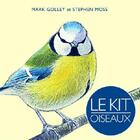-
Nombre de pages : (-)
-
Collection :
(-)
-
Genre :
(-)
-
Thème :
Non attribué
-
Prix littéraire(s) :
(-)
Résumé:
Can Britain make room for wildlife? Stephen Moss believes it can. The newspaper headlines tell us that Britain's wildlife is in trouble. Wild creatures that have lived here for thousands of years are disappearing, because of pollution and persecution, competition with alien species, changing... Voir plus
Can Britain make room for wildlife? Stephen Moss believes it can. The newspaper headlines tell us that Britain's wildlife is in trouble. Wild creatures that have lived here for thousands of years are disappearing, because of pollution and persecution, competition with alien species, changing farming and forestry practices, and climate change. It's not just rare creatures such as the Scottish wildcat or the red squirrel that are vanishing. Hares and hedgehogs, skylarks and water voles, even the humble house sparrow, are in freefall. But there is also good news. In Newcastle, otters have returned to the river Tyne and red kites are flying over the Metro centre; in Devon, there are beavers on the River Otter; and peregrines - the fastest living creature on the planet - have taken up residence in the heart of London.Elsewhere in the British countryside things are changing too. What were once nature-free zones are being 'rewilded'; giving our wild creatures the space they need - not just to survive, but also to thrive. Stephen Moss has travelled the length and breadth of the UK, from the remote archipelago of St Kilda to our inner cities, to witness at first hand how our wild creatures are faring, and offers us this complex, heartfelt and often unexpected response.
Donner votre avis









